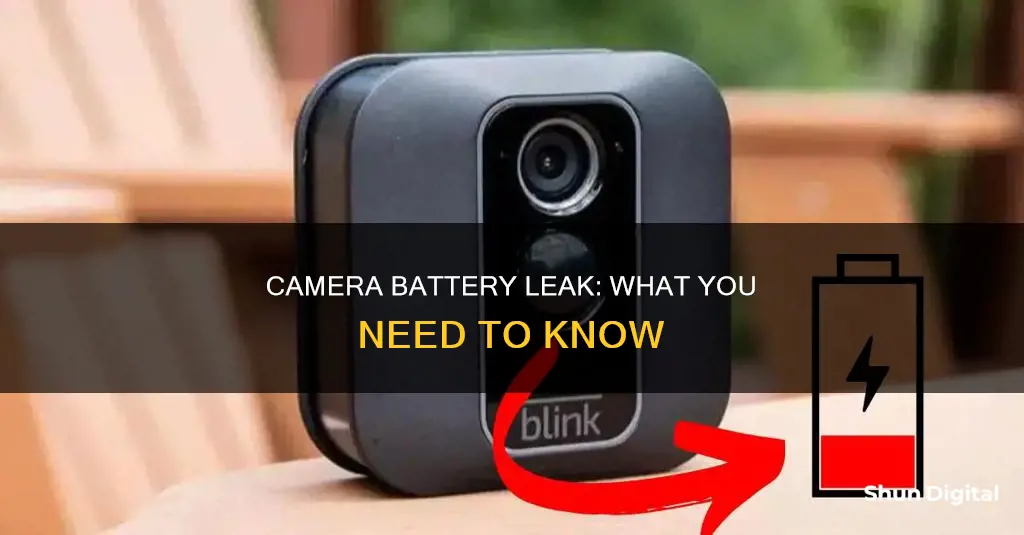
Camera batteries can leak, and it's a problem that many camera owners have experienced. Alkaline batteries, in particular, are prone to leaking. When left in a device for an extended period, all batteries will slowly discharge, and a build-up of gas will leak out in the form of battery acid, which can cause corrosion and damage electronic devices. This can usually be cleaned, but it's a hassle and it's better to prevent it from happening in the first place. The best way to do this is to simply remove batteries from devices that you don't plan on using for a while and store them in a cool, dry place.
| Characteristics | Values |
|---|---|
| Do camera batteries leak? | Yes, especially alkaline batteries. |
| Why do they leak? | The chemical reaction inside the battery generates power through use or self-discharge, breaking down the liquid electrolyte and releasing hydrogen gas. This creates pressure and can cause the battery to rupture and leak. |
| What does the leak look like? | A white, crusty residue or powder. |
| Is the leak dangerous? | Potassium hydroxide, the liquid electrolyte, can cause eye, skin, and respiratory irritation. If you come into contact with it, rinse the affected area and consult a doctor. |
| How to clean a leak | Wear gloves and remove the batteries. Gently wipe away any corrosion with a cotton swab. Dip a cotton swab in vinegar or lemon juice and clean the affected area. Dry with a cotton swab and leave the battery compartment open to dry completely before inserting new batteries. |
| How to prevent leaks | Remove batteries from devices that will not be used for a while. Heat and moisture affect the rate of corrosion, so store devices in a dry, cool place. Do not use expired batteries. |
What You'll Learn

Alkaline batteries leak when net potential voltage is applied
Alkaline batteries are prone to leaking due to the breakdown of the liquid electrolyte inside them. This breakdown leads to the release of hydrogen gas, which, if left unchecked, can increase pressure and eventually rupture the battery's casing.
The liquid electrolyte in alkaline batteries is potassium hydroxide, which can be highly corrosive and cause damage to electronic devices. When the seals at the ends of the battery are breached, or the steel canister corrodes, the hydrogen gas escapes, along with the potassium hydroxide. This can then react with carbon dioxide in the air to form potassium carbonate, a white powder that can cake onto the battery's shell.
While the potassium carbonate is relatively stable, it can still cause adverse effects on electronic devices. It is advisable to wear gloves and refrain from inhaling or ingesting the powder when handling it.
To prevent alkaline battery leakage, it is important to use high-quality batteries from reputable manufacturers and to store them in a cool, dry place. Regularly checking and replacing batteries, especially when they are close to their expiration date, can also help reduce the risk of leakage.
Lithium-ion batteries are a better alternative to alkaline batteries as they are less prone to leakage due to the absence of off-gassing. They are also more cost-effective in the long run, as they can be recharged multiple times.
Charging Your Fujifilm Camera Battery: Alternative Methods
You may want to see also

Parasitic drain in appliances increases the likelihood of leakage
Parasitic drain, also known as phantom or vampire energy, is a constant draw of power from an appliance that is turned off. This is because the appliance is still running in the background, using standby power. In the case of cars, a parasitic battery drain is when there is an abnormal and continuous discharge of power after the engine has been shut off.
Parasitic drain can be caused by a short circuit or an electrical device that remains in the "on" position. In cars, this could be an under-hood or glove-compartment light. It can also be caused by a bad alternator diode or a faulty battery.
Parasitic drain increases the likelihood of leakage because the appliance is constantly drawing power, even when turned off. This can lead to the battery being drained of power, which can cause it to leak.
To prevent parasitic drain, appliances can be unplugged when not in use. For appliances that are difficult to unplug, such as TVs and cable boxes, power strips can be used to turn off multiple devices at once.
To test for parasitic drain in a car, a digital multimeter can be used to measure the amperage or voltage. If the reading is higher than the normal range, there is a parasitic drain problem. The fuses can then be checked one by one to locate the faulty circuit causing the drain.
By identifying and correcting the parasitic drain, the likelihood of battery leakage can be reduced.
Battery-Powered Wi-Fi Cameras: Night Vision Included?
You may want to see also

How to clean a gadget caked with the aftermath of a leaking battery
It is important to act quickly when dealing with a leaking battery, as the longer it is left, the more damage it can cause. The first step is to protect yourself: wear gloves and safety glasses to shield your skin and eyes from the harmful chemicals.
Next, open the device and remove the corroded batteries, placing them in a sealed plastic bag. Be sure to dispose of them correctly.
Now it's time to clean the device. You will need a neutralising substance such as lemon juice or vinegar to apply to the corroded areas. Gently brush the areas with a cotton swab or toothbrush, and the crystals will begin to melt away. For stubborn spots, try scrubbing with a toothbrush. For very heavy corrosion, fine sandpaper, an emery board, or a small flathead screwdriver can be used, but be gentle.
After this, use isopropyl alcohol to clean off any remaining residue. Then, dry the device thoroughly before reassembling it.
Finally, insert new batteries and power up the device. Hopefully, it will now be working as good as new!
Rechargeable Camera Batteries: Charged or Not When Bought?
You may want to see also

How to prevent battery corrosion
Yes, camera batteries can leak, and this can cause corrosion. Corrosion can also be caused by typical wear and tear, as well as the age of the battery, overheating, and leaking fluid. Corrosion can reduce battery life and cause electrical problems.
Protect
After cleaning the terminals, coat them with dielectric grease or battery terminal protector. A generous application will help prevent corrosion in the future.
Maintain correct charge
Corrosion on the positive terminal may indicate that your battery is overcharging, possibly due to a faulty voltage regulator. Corrosion on the negative terminal may be a sign of undercharging. This can happen if you're taking short trips, and your electronic system is drawing a lot of power for onboard electronics.
Regular electrical system checks
Regularly bring your vehicle in for checks for electrical faults. Routine maintenance of all systems, including electrical, is important for the health and longevity of your vehicle. A trusted technician can help keep your car running for years.
Clean regularly
Even if you take the above preventative measures, it's still a good idea to regularly clean your battery terminals. Pop the hood periodically and give the battery terminals a good clean as needed.
- Use a wire brush or scraper to remove solid, powdery corrosion from around the terminals.
- Neutralise the remaining corrosion with a commercial battery terminal cleaner or a solution of baking soda and warm water.
- Dry and polish the battery casing, posts, and terminals with a microfiber cloth.
- Use a terminal cleaning brush to remove any debris or coating from the terminals that may interfere with the connection.
Charging Camera Batteries: Using Your Car's Power
You may want to see also

Lithium batteries are less likely to leak
In contrast, alkaline batteries contain a liquid electrolyte that breaks down over time, releasing hydrogen gas. If an alkaline battery sits too long, the pressure can build up and eventually rupture the case, leading to leakage. Therefore, lithium batteries are a better choice to prevent leaks and are also more cost-effective in the long run.
While lithium batteries are less likely to leak, it is important to note that they are not completely leak-proof. Under abnormal conditions, such as physical damage, manufacturing defects, overcharging, or exposure to high temperatures, lithium batteries can still leak. To minimize the risk of leakage, it is recommended to purchase lithium batteries from reputable manufacturers, store them properly, and follow the manufacturer's instructions for charging and usage.
Additionally, proper disposal of lithium batteries is crucial. Improper disposal can harm the environment and increase the risk of leakage if the batteries are damaged or punctured. By following these guidelines and staying vigilant, users can reduce the likelihood of lithium battery leaks and ensure the safe operation of their devices.
GoPro 6 Black: Charging and Camera Functionality
You may want to see also
Frequently asked questions
Yes, there is a chance that alkaline batteries will leak if left in the camera for a long time. This is because they continue to slowly discharge, and a build-up of gas will leak out in the form of battery acid.
First, remove the batteries. Then, wear gloves and use a cotton swab to gently wipe away any corrosion debris in the device, taking care not to get any on your skin or in your eyes. Next, dip a cotton swab in a little bit of white vinegar or lemon juice and clean the device's components with the wet swab. You may hear a slight sizzling noise, which is a sign it's working. Finally, take a dry cotton swab to remove any moisture and leave the battery compartment open to dry before putting in new batteries.
The best way to prevent corrosion is to take the batteries out of the camera if you won't be using it for a while. Heat and moisture affect how quickly the batteries corrode, so be sure to store your camera in a dry, cool place.
Lithium batteries are more expensive but far less prone to leaking and less likely to self-discharge.







